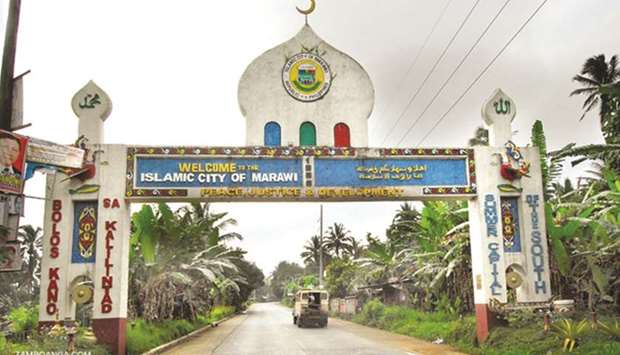
The master plan aims to transform the main battleground in Marawi City u2013 which, prior to the siege, was known for its bustling trade, grand mosques, and dynamic madrassas u2013 into a tourist destination.
Ironic.
That is how Sultan Abdul Hamidullah Atar described the planned rehabilitation of Marawi, the capital of Lanao del Sur province on the Philippine island of Mindanao, a year after the Maute Group, also known as the Islamic State of Lanao, launched an attack on the city on May 23, 2017.
The five-month battle that followed resulted in the death of more than 1,000 people and displaced 360,000 more.
Marawi’s people, called Maranaos, are fiercely independent.
Like the rest of the Moros (as the Muslim peoples of Mindanao are known), the Maranaos (or “People of the Lake,” because they have built their lives and homes by Lake Lanao) were never conquered or colonised by the Spanish, the Americans, or the Japanese, as opposed to other Filipinos from the Luzon and Visayas regions.
But now, as Atar noted, they view the participation of Chinese firms in the rehabilitation of Marawi as an intrusion, if not outright invasion.
A consortium composed of five Chinese firms and four Filipino partner companies has submitted a master plan for rebuilding the conflict-torn city.
The master plan aims to transform the main battleground in Marawi City – which, prior to the siege, was known for its bustling trade, grand mosques, and dynamic madrassas – into a tourist destination.
The $328mn plan, covering 250-hectares, is modern and glitzy, with sprawling walkways, grandiose waterfront resorts, Instagram-worthy parks and plazas, an eco-trail, and a convention hall.
But the Maranaos say it’s not Marawi.
It does not capture their culture, tradition, or identity as historic weavers and traders, as the People of the Lake.“We do not want beautification,” one displaced Maranao matriarch said.
What Maranaos want is the chance to be allowed to rebuild their houses.
They have their own vision; their own planners, architects, and engineers; and their own manpower.
The problem with the master plan, according to civil-society groups, is that it was reportedly developed without meaningful consultation with other stakeholders.
On March 30, hundreds of Maranaos held a peaceful protest to demand that they be included in the plan’s formulation.
The potential entry of Chinese firms in the massive rehabilitation of Marawi City is the latest major venture for China in the Philippines.
Just this April, the Chinese companies Shanghai GeoHarbour Group, Jovo Group, and Zhongfa group signed multibillion-dollar agreements with the Philippine government for land reclamation, construction of liquefied natural gas (LNG) terminals, and thermal energy projects.
The increasing presence of Chinese firms in the Philippines is a result of President Rodrigo Duterte’s pivot to China in October 2017.
Invoking the country’s need for an “independent foreign policy,” he threatened to scuttle his country’s military agreement with its longtime ally, the United States, and vowed to work with China instead.
Since then, Chinese money and firms have poured into the country, vying to build infrastructure.
In 2017, investments from China reached $31mn; by April 2018, an additional $9.5bn was expected, creating 10,800 jobs for Filipinos in tourism, agriculture, and e-commerce.
China State Construction Engineering Corp Limited, the government-run firm vying for the contract to rebuild Marawi City, is among the world’s largest 100 publicly traded companies, with market capitalisation of $43.2bn in 2017.
But the company also was blacklisted by the World Bank in 2009 for colluding with three other Chinese companies in a $33mn road project in the Philippines.
Duterte reasons that he can do more for Filipinos – at least his own constituents – by welcoming Chinese investment to build infrastructure across the country.
He has also concluded that it is not worth resisting China’s claims to large parts of the South China Sea, notwithstanding a 2016 international court ruling rejecting those claims.
He has said publicly that the Philippines is no match for China’s military might.
Thus far, Duterte’s gamble appears to be paying off.
His popularity among Filipinos remains high, with a net satisfaction rating of 56% for the first quarter of 2018.
The Marawi City protests, however, signal a more complex long-term dynamic, one that is playing out in parts of Africa and Latin America where China has made deals with national governments.
Chinese money strengthens local elites and often fuels corruption.
Chinese firms hire mostly Chinese workers.
And Chinese plans proceed independently of local culture and input.
Over time, locals who are shut out become increasingly fed up.
The recent history of Marawi is a cautionary tale.
The Maute Group, which was led by Isnilon Hapilon, the emir of ISIS in Southeast Asia, and former Moro Islamic Liberation Front members Abdullah and Omar, exploited long-term resentment of outsiders and discrimination against Moros in their recruitment materials.
Failure to include moderate Maranaos in the reconstruction of their own city and its governance could fan the flames of radicalism again.
More generally, accepting Chinese money on Chinese terms fuels grievances against a type of economic imperialism with which the US government and American companies operating across the developing world in the 20th century are all too familiar.
Sooner or later, resistance movements build under a nationalist flag; expropriations ensue.
And in an era in which open data and global anti-corruption movements are gaining strength, shady deals will be exposed much more quickly.
For the People of the Lake, Marawi is not just another concession for China.
It is their home.
Those attachments create emotions and energy that the Philippine government ignores at its peril. – Project Syndicate
* Anne-Marie Slaughter is President and CEO of New America. Purple Romero is a Filipina multimedia journalist who has written about politics, gender issues, the environment and international relations for foreignaffairs.com, Asia Sentinel, South China Morning Post, and The Guardian.
